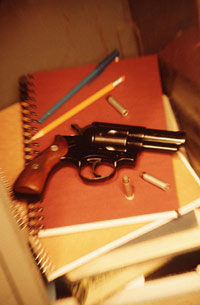Columbine in Mind

Tighter security for schools
by Ricco Villanueva Siasoco |
 As a precaution against weapons on campus, some schools have installed airport-style metal detectors. "I'll just ignore them. I don't think they'll bother me that much." Related Links
Resources |
Metal detectors at the school door? Random bookbag searches? Mounted surveillance cameras and bar-coded ID badges?
This is the reality for many students as they return to schools. Across the country, school boards and administrators, in association with parents and community groups, have implemented tougher security standards in the wake of last year's school shootings in Littleton, Colorado, and Conyers, Georgia.
The need for these measures is evident. According to a 1997 study by the U.S. Dept. of Education and the Journal of the American Medical Association, 8.5% of the students responding said they had carried a weapon at school. Another 7.4% said they had been threatened or injured with a weapon at school.
With these heightened precautions, some critics wonder: Are the civil rights of students being violated?
Heightened security
Sandia Labs, based in Albuquerque, N.M., has recently put its knowledge of securing nuclear weapons facilities to protecting top-secret social studies notes. Funded by the U.S. Department of Energy, the laboratory is among a host of organizations helping schools to upgrade current security.
In a New Mexico elementary school, Sandia installed "hand geometry" readers that read the unique print of a human hand. Lab representatives and school administrators use the technology to ensure only authorized adults pick up children. In Odessa, Texas, Sandia has partnered with school officials at Permian High School to install 17 surveillance cameras to monitor the parking lot and front entrance, and "black boxes" (cameras containing audiotape) in several classrooms.
Another organization waging the war for school safety is National School Safety and Security Services, a non-profit organization that has provided school security and crisis preparedness training in over 30 states. The 15-year-old company has seen a marked increase in business since last year's shootings.
Profiling and other policies
While the Senate and media have focused attention this past summer on police practices of racial profiling, some schools districts have joined the fray.
In cooperation with professional profilers, these schools are aggressively collecting information on students who are prone to foul language, cruelty to animals, or writing with an interest in "dark" subjects such as death.
In fact, formal disciplinary action has been already been taken on students for donning black armbands in school, wearing religious symbols, or coloring one's hair. School officials cite the Littleton, Co., tragedy as rationale behind their actions.
In a letter to a Virginia high school student suspended for dyeing his hair blue, an official wrote, "The school administration has ruled that students who wear unusual or unique hair colors, such as blue or green, are to be removed from school...in view of the circumstances that have occurred recently, the governor expressed that unusual activities/appearances should not be ignored."
It remains to be seen whether these policies will improve safety in schools by curbing students inclined toward violent behavior, or further marginalize unconventional kids who are not dangerous.
Don't worry, be happy?
Asked if the surveillance cameras bothered her, a student returning to Columbine High School said, "I'll just ignore them. I don't think they'll bother me that much."
For administrators, however, preparedness is one way to minimize security risks. According to a recent article in Time magazine, a high school in Williams Bay, Wisconsin, even added a dramatic reenactment of a school shooting to its roster of drills. Explorer scouts, armed with blanks, pretended to shoot the school principal and take hostages.
Other voices
The American Civil Liberties Union (ACLU) is among the leaders in combating the notion of school facilities as penitentiaries. Recognizing the need for precaution, the group worries that new school policies may infringe on students' rights as individuals.
In addition to legal battles against overly prohibitive school districts, the organization encourages students to start their own ACLU student groups.
Like the ACLU, the Federal government has tackled the issue of school safety. President Clinton recently unveiled a public service announcement that encourages youth to communicate violent incidents, or knowledge of incidents, to their parents.
In August, the President initiated a national campaign to combat youth violence, and announced the Justice Department's commitment of $15 million to fund innovative partnerships between local police and school and community groups.
Schools may always grapple with the question of campus safety. However, with tighter regulations and security measures, school officials, parents, and community groups hope to lessen the variables beyond their control.







